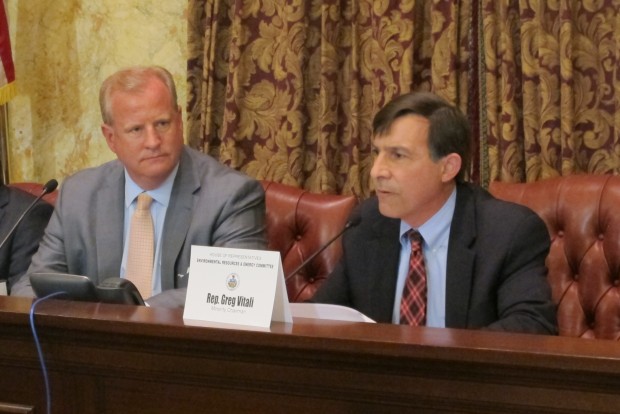House and Senate panels reject oil and gas regulations
-
Marie Cusick

Marie Cusick/ StateImpact Pennsylvania
Rep. John Maher (R- Allegheny), left, and Rep. Greg Vitali (D- Delaware) angrily talked over each other at a legislative hearing on the drilling regulations.
“Shameful,” “egregious,” “costly,” and “illegal” were some of the words used by lawmakers to describe new regulations for Pennsylvania’s oil and gas industry.
The House and Senate Environmental Resources and Energy Committees both voted to reject the regulations Tuesday, which are currently before the state’s Independent Regulatory Review Commission (IRRC).
Conventional drillers have long complained the rules would unfairly lump them in with the newer, deeper wells of the unconventional, Marcellus Shale industry.
In 2014 lawmakers used a budget-related bill to require separate regulations for the two types of drillers.
Now, they say, the state Department of Environmental Protection is ignoring that law.
“The department simply copied and pasted the regulations,” said Sen. Gene Yaw (R- Bradford). “The two industries are different in size and scope and should be treated accordingly.”
Yaw also says DEP relied on sections of the state’s 2012 oil and gas law, known as Act 13, that were struck down by the state Supreme Court to justify expanding protections of public resources, such as schools.
During the House hearing, things got rather ugly between Rep. John Maher (R- Allegheny) and Rep. Greg Vitali (D- Delaware). The two men are their party’s respective chairs of the committee, and began angrily talking over each other at various points.
“I’ve been working on this for over four years,” said Vitali. “These regulations are long overdue. There is a concerted effort by the conventional industry not to be regulated. That’s really what’s going on.”
He went through a list of differences between the rules for conventional and unconventional drillers and criticized the entire hearing as an “orchestrated attempt” to defeat the regulations.
“You’re attacking the motives of members,” Maher said. “That’s never appropriate.”
Rep. Kathy Rapp (R- Warren) said the DEP did not account for the impact the rules would have on small businesses and believes they would crush the conventional industry.
“Since the Marcellus industry has moved out of the state, guess where [DEP is] going? To the conventional sites,” she said. “They’re trying to find every little violation to fine our guys.”
“These are not mere technicalities,” Maher added. “It was a Republican initiative to review and update regulation of the gas patch. Yet, I strongly believe you cannot make law while you break law.”
DEP Secretary John Quigley says the regulations have received an unprecedented amount of public participation.
“The Legislature is exercising their prerogative to review the regulations. The final regulation package is the result of all public input provided as well as the Department’s experience with both conventional and unconventional oil and gas activities,” he said in an email. “I am confident that they will be approved by IRRC and ultimately adopted.”
The rejection of the rules by the legislative committees does not halt the process.
IRRC will still hold a public meeting on April 21st to make a decision. If the commission approves the rules, the legislative committees could then issue concurrent resolutions to disapprove them again, which would go to the full House and Senate for a vote. However, if approved by the General Assembly, such a maneuver would likely face a veto threat from Governor Tom Wolf.
















